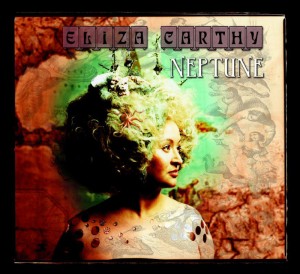For those young adults (like myself) who grew up listening to traditional folk music it feels quite surreal, even disarmingly uncomfortable, to have to weave into an Eliza Carthy review a brief description of the artist herself, of where she fits in. I was told not to like Eliza Carthy when I was a child. Her music wasn’t traditional enough for my parents’ ultra-trad tastes and I think they thought she looked a bit like a punk. I saw her when I was about seven or eight, somewhere on the same bill as Billy Bragg. Perhaps I shouldn’t have trusted my parents’ opinion when they didn’t approve of him either.
Carthy has constantly reinvented her style since then, going through popular phases, very traditional phases, not-so-traditional phases; she can do intimate a’cappella solo performances or line up next to hybrid supergroup The Imagined Village; she’s changed her look, changed her audience, over and over again. But Neptune is not just another reinvention – it’s about a hundred-in-one album. If there is one presiding genre I’d call it something like ‘music hall tinged pop with jazz interludes’ – but like the best solo records, Neptune defies genre because the music feels its way around each song, choosing the best instrument and melody to help the lyrics feel their way into the story. Folk remains in the background, not pushed aside, but alive in the echoes of old songs and children’s rhymes and in that push for narrative and desire to tell life’s little stories, and to tell them well.
There has been some discussion in the last few years of traditional folk music’s political implications, whether it soundtracks white nationalism for example, or whether it promotes important cultural dialogue. Carthy has found herself at the centre of this debate, sometimes unwantedly associated with the former, whilst passionately advocating and campaigning for the latter. This album could appear contrary to all sides: within one track, the phenomenally intricate ‘Britain is a Car Park’, Carthy embellishes multicultural influence – flamenco, modern gypsy – whilst painting globalisation into a dystopic vision of rootless industrialism, via Joni Mitchell and Parno Graszt.
The triumph of Neptune is that any attempt to seek one simple viewpoint, one simple keynote, will be confronted with changes and contradictions in mood and movement at every phrase. Carthy could become to be seen as one of Britain’s pre-eminent songwriters off the back of this album and I’d love to see a Mercury nomination go her way this year. Just imagine what my parents would think of that.
Words: Tom Moyser


1 comment for “Album: Eliza Carthy – Neptune”